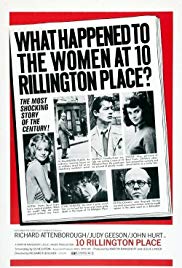
10 RILLLLINGTON PLACE (THE STRANGLER OF RILLINGTON PLACE)
UK, 1970, 113 minutes, Colour.
Richard Attenborough, John Hurt, Judy Geeson, Pat Heywood, Robert Hardy, Andre Morell.
Directed by Richard Fleischer.
The Strangler of Rillington Place is the more sensational export title for 10 Rillington Place, Richard Fleischer's film about Reginald John Christie. Christie attained notoriety in the 50's, especially when it emerged that Timothy Evans had been hanged wrongly for the murder of his wife and baby. Christie had killed them along with a number of other women dating back to 1944. Ludovic Kennedy wrote a book condemning Christie and vindicating Evans. The film is based on his book.
The film has a grim, thought-provoking theme. It does not explore Christie's personality very much, although, in Richard Attenborough's effective portrayal, we are shown him at home, fussy, killing, giving evidence at the trial and degenerating into a lonely old age. The film offers him little sympathy and ends with the statement that he was hanged for his crimes.
However. as with Kennedy's book, the human centre of interest is Evans and John Hurt (A Man for All Seasons, Before Winter Comes, In Search of Gregory) gives a performance that is well worth seeing. Evans, a young Welshman, is illiterate but dreams of getting better jobs, boasts about himself, loves his wife but has a flaring temper. He is an easy victim for Christie's quietly menacing persuasion. It is sad to see him hang. (But the film makes no overt statement on capital punishment.)
Richard Fleischer directed the film on the Loeb murder, Compulsion and also The Boston Strangler. He is a competent, if not outstanding director (Che, Doctor Doolittle, Tora! Tora!). The film was made at Rillington Place itself and makes one pause to reflect on the sadness of the criminally insane and the evil that is wrought by them.
1. What were your first impressions of Christie as he committed his first murder? Did this prejudice you against him from the start?
2. Did the film give you any real insight into his motivation. his sanity? Did he have any redeeming features?
3. What was the effect of the environment of the house,, darkness and garden of 10 Rillington Place on the mood of the film?
4. What kind of a man was Timothy Evans shown to be - illiterate, a dreamer, a braggard, genial but violent- tempered? How sympathetically was he presented in the film?
5. What kind of a woman was Beryl - young and inexperienced, loving, frightened of having another baby?
6. When did Christie decide to kill Beryl? Why did he persuade them both he was a qualified abortionist?
7. How did Christie make Evans the victim of circumstances? Did he do it maliciously or did it just grow?
8. Why did Evans do exactly as Christie suggested? Was he capable of doing otherwise?
9. Why did he give himself up? Why did he make such a poor showing at the trial?
10. What were your impressions when you heard Christie’s record of convictions? Did the film evoke any sympathy for him as he endured the trial, quietly spoken and unwell?
11. How did you feel for Evans in the period before his death and when he was hanged?
12. What comment did Evans' hanging make on the value of capital punishment?
13. Why did Christie kill his wife and the others?
14. Should Christie himself have been hanged or been given life imprisonment?
15. How does a film like this help in understanding the criminally insane and the workings of justice?
Created by: malone last modification: Saturday 23 of June, 2012 19:27:39 by malone
edit